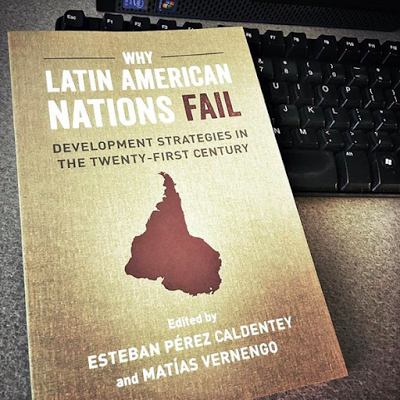Brief summary of the content of the book published in the newsletter of the World Economics Association.Institutions are central to explaining the way in which, nations grow and develop. Traditionally the study of institutional economics focused on a very broad range of interests and made contributions in several different areas, including the structure of power relations, the beliefs systems, and also social norms of conduct. Contrarily the New Institutionalist turn in mainstream economics places the weight of its explanation on property rights.Within the logical construct of neoclassical economic theory, the contribution of the New Institutional Economics is a necessity, basically because exchange and production in a market economy requires the prior definition of property rights
Topics:
Matias Vernengo considers the following as important: Latin America
This could be interesting, too:
Matias Vernengo writes Is dependency over?
Matias Vernengo writes New book on the crisis of economics and teaching in Latin America
Chris Blattman writes The terrible trade-off: Why less violent cities often means more powerful and organized crime
Matias Vernengo writes Financialization, Deindustrialization, and Instability in Latin America
Brief summary of the content of the book published in the newsletter of the World Economics Association.
Institutions are central to explaining the way in which, nations grow and develop. Traditionally the study of institutional economics focused on a very broad range of interests and made contributions in several different areas, including the structure of power relations, the beliefs systems, and also social norms of conduct. Contrarily the New Institutionalist turn in mainstream economics places the weight of its explanation on property rights.
Within the logical construct of neoclassical economic theory, the contribution of the New Institutional Economics is a necessity, basically because exchange and production in a market economy requires the prior definition of property rights (endowments and their distribution are part of the data jointly with technology and preferences that are needed to establish a market equilibrium). Because neoclassical theory is a-historical, the same framework derived from a priori reasoning must have universal validity and be applicable to any particular historical episode underscoring, in this way, the invariance of human behavior in space and over time. This dictates the New Institutionalist Economics´ approach to history which materializes in providing examples of hand-picked empirical evidence across different centuries, regions and countries and interpreting these as coherent with the deductive universal framework of neoclassical theory.
Acemoglu and Robinson’s influential book Why Nations Fail (2012) constitutes one of the most comprehensive and illustrative examples of this line of thought. Its authors argue that the economic failure or success of countries depends on whether these have inclusive or extractive political institutions. Inclusive political institutions are those that distribute power broadly, constrain arbitrary exercise, and make it harder to usurp power or set the basis for rent-seeking behavior. Inclusive political institutions require well defined and secure property rights. Extractive institutions have the opposite characteristics.
Why Latin American Nations Fail is in part a response to this New Institutionalist turn in mainstream economics focusing on the case of Latin America.

